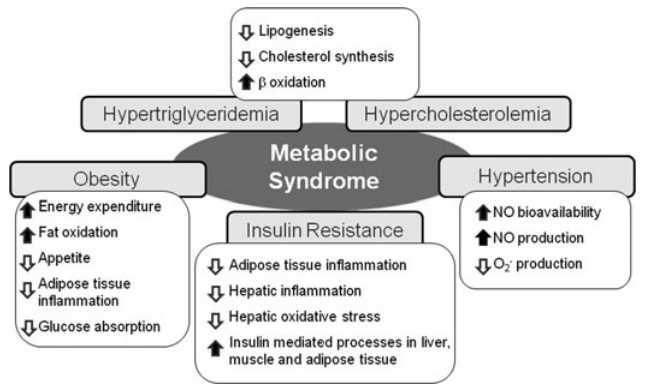Metabolic syndrome is a cluster of disorders that can be generalised to result from dysfunction of the energy and appetite regulatory systems. An exact diagnosis of metabolic syndrome is difficult, but individuals with high triglyceride levels, alterations to normal lipoprotein concentrations, abdominal obesity, non-alcoholic fatty liver disease (NAFLD), high blood glucose levels, high blood pressure as well as underlying systemic inflammation and oxidative stress, typify a patient with metabolic syndrome. The exact cause of metabolic syndrome is not known, but the disorder is characterised by insulin resistance, hyperinsulinaemia and hyperglycaemia. A large body of evidence suggests that dysfunction to the insulin system, caused by poor quality foods, is the cause of the metabolic syndrome. Reversing insulin resistance is effective at reversing many of the symptoms, and this provides strong evidence that the insulin resistance associated with metabolic syndrome is the actual cause of the disorder.
Dietary components have been shown to be beneficial at reversing the symptoms of metabolic syndrome, and many such foods are plant foods. The ability of plant foods to protect from the damaging effects of metabolic syndrome has been suggested to result from the phytochemicals present in plants, many of which are antioxidants. One such group of phytochemical antioxidants, the flavonoids, a diverse group of polyphenols, have been researched and shown to provide protection from many of the symptoms of metabolic syndrome. In particular, flavonoids have been shown experimentally, using cell culture, animals models and human trials to be effective at reversing obesity, hypertriglyceridaemia, hypercholesterolaemia, insulin resistance and hypertension (figure 1). The benefits of flavonoid may derive from their antioxidant effects, as oxidative stress is heavily implicated as a causative factor in the development of insulin resistance. Their antioxidant effects also explain their anti-inflammatory effects.

Figure 1. The effects of dietary flavonoids (flavanones, favan-3-ols, flavones, flavanols, anthocyanins and proanthocyanidins) on the symptoms of the metabolic syndrome1.
RdB
